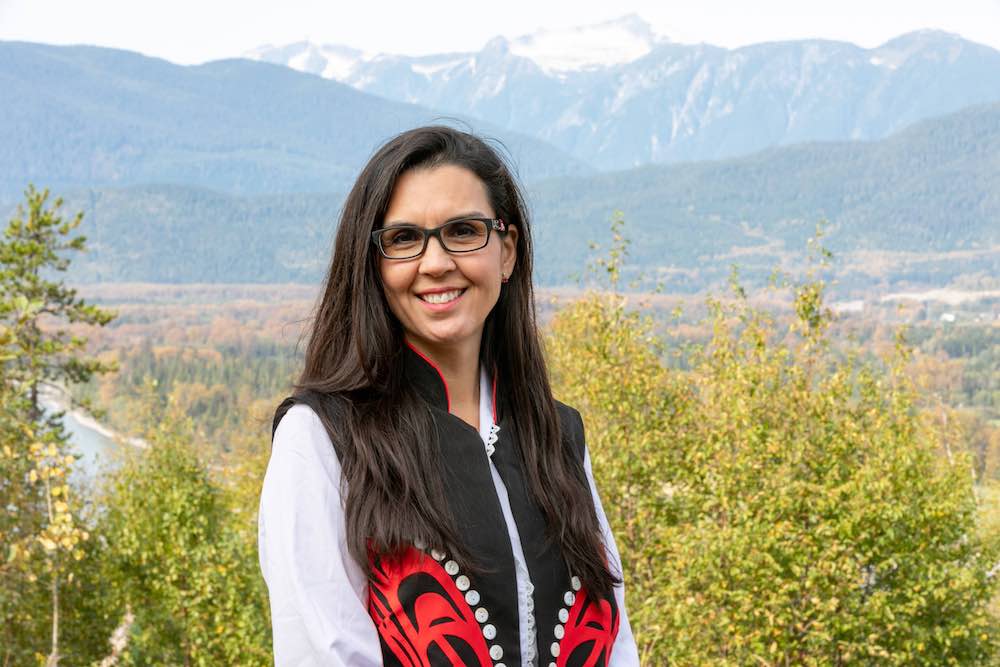Bees, berries and fish. At first glance, the three things appear unrelated — to politics, anyway. But they form the basis of a philosophy on which Nicole Halbauer, NDP candidate for the Skeena riding, has built not only her campaign for the B.C. election, but her life.
“For my own culture, what I’m trying to instil in my granddaughter is you need to be able to harvest on our laxyuup. You need to be able to pick those berries. You need to be able to know when those salmon are running. And you need to be able to do all of that in a balanced way,” she says.
Her granddaughter, now two, was born six hours to the east in Prince George, where her son-in-law could find work. Eventually, the family was able to return to Terrace — only to struggle with finding child care and affordable housing.
For Halbauer, bees, berries and fish represent all things in balance.
“You need to not only maintain your environment, but also make sure that the people that you’re working for, fighting for, have roofs over their head, child care and the health care that they need,” she says.
“Bees, berries and fish aligns with child care, housing and jobs, and you’ve got to be able to balance those altogether. Otherwise, the whole matrix just falls apart.”
Halbauer spent her childhood moving with her father’s work — Prince George, Edmonton, Quesnel — but settled back in her mother’s home of Kitsumkalum, a Tsimshian community on the outskirts of Terrace, in the 1980s. She raised six children there before moving across the Skeena River to Thornhill, on the other side of town.
The Skeena riding, on B.C.’s north coast, encompasses Terrace and Kitimat, small cities that have boomed in recent years with LNG development. While the jobs are welcome, an influx of people has led to skyrocketing housing prices and increased demand for services.
It’s a riding that could go either way in the election. While the NDP has spent about two-thirds of the past half-century representing the region, recent decades have seen close races between them and the BC Liberals. The current Liberal MLA, Ellis Ross, was elected in 2017 with 52 per cent of the vote. The NDP took 43 per cent.
Ross, former chief councillor for the Haisla Nation, is seeking re-election on a platform that focuses on economic development. He has been a vocal supporter of LNG and, in particular, the Coastal GasLink project currently under construction across northern B.C. The pipeline will terminate at an LNG Canada terminal under construction on Haisla territory. The Green party is not running a candidate.
Halbauer says the biggest difference between herself and Ellis is the diversity of her platform.
“You cannot pick a single item on your list of the things that you’re most comfortable with and that be the only thing you talk about,” she says.
“I talk about things I’m not comfortable talking about. I talk about things that are not my expertise. But I understand how they impact the things I am passionate about. I really believe that to be an effective MLA you need to take a look at every person in your riding, every sector in your riding, every issue in your riding. It cannot be a single issue that you want to focus on because that’s where you’re most comfortable.”
Among those things that Halbauer is less comfortable discussing may be LNG, a highly-divisive topic in the North. While the current NDP government has offered its support to Coastal GasLink, Wet’suwet’en hereditary chiefs in the neighbouring Stikine riding oppose the pipeline through their territory. Elected band councils along the pipeline route have signed benefits agreement with pipeline owner TC Energy.
Earlier this year, RCMP removed pipeline blockades and arrested 28 people on Wet’suwet’en territory, spawning solidarity actions across the country.
While the pipeline moves ahead, other LNG projects are on the horizon. TC Energy’s Prince Rupert Gas Transmission pipeline is not entirely off the table, and the Haisla Nation hopes to build its own export terminal.
When asked about her stance on future LNG projects, Halbauer defers to the NDP’s CleanBC plan, which she had a hand in developing. It requires an 80-per-cent reduction in greenhouse gas emissions by 2050 from 2007 levels.
“I would say, first, you’ve got to pass the CleanBC test, and I think that those are pretty stringent markers,” she says. “What I really like about it is, it’s not single-project focused. This is a total — these are the totals across [the province]. If you can’t fit within that total, you cannot get your project through, and the totals are pretty stringent.”
By some estimates, emissions from B.C.’s current oil and gas production will already exceed CleanBC targets by more than 50 per cent.
When pressed by constituents on Facebook, Halbauer offered more thoughts about her approach to LNG development.
“The reality is, the world is transitioning away from petrochemical-based fuels, but there will be a market for transformational products such as LNG for at least a decade or two,” she says, adding that a hard no to LNG is “too simplistic and won’t meet the reality of the Skeena riding and its people.
“We’re moving in the right direction, too fast for some, not fast enough for others.”
As we chat, she points to other economic opportunities for the region, such as recent exploration into wind and geothermal power.
“These are things that need some more spotlight on them, because those are really green opportunities. I think we need to focus on them a little bit more and support them in their development,” she says.
Kitimat Mayor Philip Germuth declined to comment on the election race, but put continued LNG development high on the list of priorities for the region, in addition to the Northwest BC Resource Benefits Alliance that’s currently working toward a funding agreement that would return a greater share of provincial resource revenue to northern communities.
He also puts affordable housing and the rebuilding of Terrace’s Mills Memorial Hospital, which is set to start soon, on the list of priorities.
The hospital is something Halbauer says she has been “pounding away on tables” to get for a decade. It is slated to open in 2024.
Halbauer’s experience is as diverse as her platform: She has studied criminology, holds a master’s in business administration, sat on Kitsumkalum band council and the local school board and, until her campaign began, was chair of Coast Mountain College.
But, she adds, “No matter what I do, I wind up back in health.”
Since the late 1990s, she’s done work that she describes as “systemic change” in the health-care system, with positions at Pacific Northwest Division of Family Practices, First Nations Health Authority, Northern Health and First Nations Inuit Health Branch.
While she applauds the province’s response to the pandemic — “we’ve managed to make ‘be calm, be kind, be safe’ something everybody in our province knows and understands” — she says she will never stop advocating for greater resources in the North.
“I think there’s always more needed in the North. I will never be satisfied with health care in the North,” she says. “It’s great that we were designated, here in Terrace, as a centre for testing for COVID-19, but had we had our new hospital up and built we would have been able to do a greater job across the province and been more of a help.”
Halbauer also sought the NDP nomination in 2017, inspired to run for the party by Nisga’a politician Frank Calder, B.C.’s first Indigenous cabinet minister who was known for his fight for Indigenous rights.
“It was the NDP that supported him and really supported Indigenous rights, just to make us people under the rules of Canada,” she says. “So, I’ve grown up thinking the NDP was the only party that was going to be able to advance and support any Indigenous initiative. I feel like health care, child care, housing, environment, everything I am concerned about aligns within the NDP.”
After losing the nomination, she stayed on with the party’s Skeena constituency association, first as president and then outreach co-ordinator.
Sarah Zimmerman ran against Halbauer during the 2017 NDP nomination race. She says she’s seen her former competitor grow into a candidate who is more confident and self-assured.
“She’s not the same candidate that she was three years ago,” says Zimmerman, who is volunteering on Halbauer’s campaign. “She’s got three years of public service, she’s got three years of volunteer work, she’s got three years of meeting with MLAs and trying to bend their ear about the issues in Skeena.
“I think that she’s really been able to get the experience that you need in a future leader.”
The tenacity that Zimmerman describes could be attributed to Halbauer’s traditional Tsimshian name, X'sataam Hana'ax.
It means Victorious Lady.
“My mom used to say, ‘To be victorious, you’ve got to be in the fight. If you’re not in the fight, you can’t have victory.’ I keep that in my heart,” Halbauer says.
“You don’t get victory if everything’s easy.” ![]()
Read more: Indigenous, Energy, BC Election 2020
















Tyee Commenting Guidelines
Comments that violate guidelines risk being deleted, and violations may result in a temporary or permanent user ban. Maintain the spirit of good conversation to stay in the discussion.
*Please note The Tyee is not a forum for spreading misinformation about COVID-19, denying its existence or minimizing its risk to public health.
Do:
Do not: